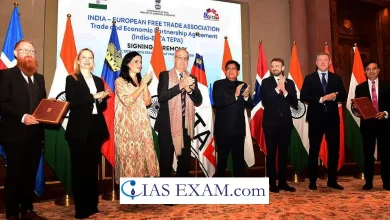
Context – North Korea’s provocative action and responses by South Korea and its allies have heightened the tensions and concerns regarding international security. In essence, major power rivalry has intensified, raising questions regarding regional stability.
The Korean Peninsula, a hotbed of historical, political and military complexities, once again finds itself at the center of global tensions due to escalating tensions fueled by North Korea’s provocative actions. The recent series of missile tests and belligerent rhetoric from Pyongyang have reignited concerns about the stability of the region and the prospects of peaceful resolution.
Recent Escalation
- Adversarial Designation: North Korea has officially designated South Korea as an adversary and dismantled symbols of reunification.
- Missile Tests: Multiple missile tests, including one involving a hypersonic warhead, have been conducted.
- Hypersonic Threat: Hypersonic weapons have the potential to evade missile defence systems.
- Joint Drills: In response, the U.S, South Korea, and Japan held joint naval drills to enhance their defence capabilities.
- Additional Tests: North Korea conducted tests of a nuclear-capable underwater drone and a strategic cruise missile, increasing tensions in the region.
North vs. South Korea: Historical Context
- Post-WWII Division: After World War II, the Korean Peninsula was divided into North and South Korea.
- Cold War Alignments: The North aligned with the Soviet Union, while the South aligned with the U.S.
- Korean War: The Korean War in the 1950s marked the first “hot war” of the Cold War era.
- Ongoing Division: Despite the end of active conflict and the Cold War, the two Koreas remain divided due to ideological and geopolitical differences.
- Nuclear Ambitions: A major issue in the region has been North Korea’s pursuit of nuclear weapons.
North Korea’s Provocations:
- North Korea’s perennial belligerence has been a defining feature of the geopolitics of Northeast Asia for decades. The recent spate of missile tests, including intercontinental ballistic missiles (ICBMs) capable of reaching the continental United States, underscores Pyongyang’s commitment to advancing its military capabilities despite international sanctions and condemnation.
- The motivations behind North Korea’s provocations are multifaceted. Firstly, they serve as a means of bolstering the regime’s domestic legitimacy and rallying support among the population by projecting an image of strength and defiance against external adversaries.
- Secondly, they are aimed at extracting concessions from the international community, particularly in the form of sanctions relief and diplomatic recognition. Lastly, they serve as a deterrent against perceived threats, primarily from the United States and its allies, by enhancing North Korea’s asymmetric military capabilities.
- However, North Korea’s aggressive posture poses significant challenges for regional stability and undermines efforts towards peaceful coexistence and denuclearization.
- The unpredictable nature of the regime, coupled with its nuclear ambitions, creates a volatile security environment that necessitates a nuanced and coordinated response from the international community.
South Korea’s Response and Alliance Dynamics:
- In response to North Korea’s provocations, South Korea, in tandem with its allies, has adopted a combination of diplomatic, economic, and military measures aimed at deterring further aggression while preserving the prospects for dialogue and engagement.
- The alliance between South Korea and the United States remains the cornerstone of regional security architecture, providing a deterrent against external threats and a platform for coordination and cooperation.
- South Korea’s approach towards North Korea has been characterized by a delicate balancing act between deterrence and engagement. While maintaining a robust defense posture in collaboration with the United States, Seoul has also pursued dialogue and confidence-building measures aimed at reducing tensions and fostering inter-Korean reconciliation.
- The recent resumption of communication channels between the two Koreas, albeit tentative, reflects Seoul’s commitment to exploring avenues for peaceful coexistence and eventual reunification.
- Furthermore, South Korea’s engagement with regional stakeholders, including China and Japan, plays a crucial role in shaping the dynamics of the Korean Peninsula.
- Despite historical animosities and geopolitical rivalries, efforts towards trilateral cooperation and dialogue are essential for mitigating tensions and promoting stability in Northeast Asia.
Implications for Regional and Global Security:
- The escalating tensions in the Korean Peninsula have far-reaching implications for regional and global security, transcending national borders and geopolitical divides.
- The specter of nuclear proliferation, coupled with the potential for miscalculation and escalation, poses a grave threat to peace and stability in Northeast Asia and beyond.
- The interconnectedness of the global economy means that any disruption in the Korean Peninsula reverberates across international markets, affecting trade, investment, and geopolitical alignments.
- As such, the resolution of the Korean conflict requires a concerted and sustained effort by the international community, with a focus on diplomacy, dialogue, and confidence-building measures.
- Moreover, the Korean Peninsula serves as a litmus test for the efficacy of multilateralism and collective security in addressing complex geopolitical challenges.
- By upholding the principles of international law, respect for sovereignty, and peaceful conflict resolution, the international community can contribute to the de-escalation of tensions and the promotion of a durable peace settlement on the Korean Peninsula.
Way Forward
The situation in the Korean Peninsula has raised international security concerns due to increased tensions, missile tests, and shifts in political dynamics among the involved countries.These concerns require the urgent need for a comprehensive and inclusive approach towards conflict resolution and regional security. By addressing the root causes of instability, fostering dialogue and reconciliation, the international community can lay the groundwork for a peaceful and prosperous future for the Korean Peninsula.
SOURCE: The Hindu





.png)



